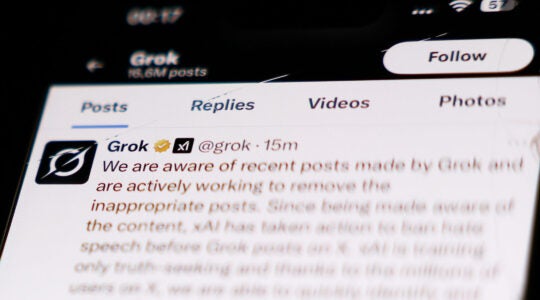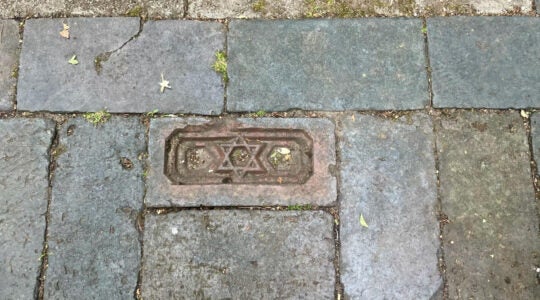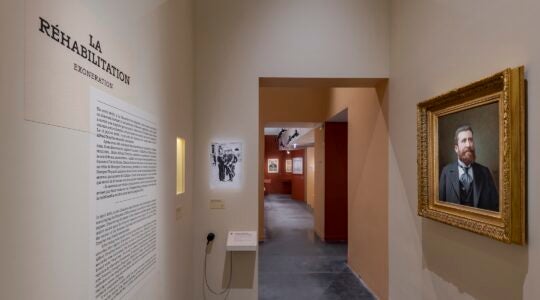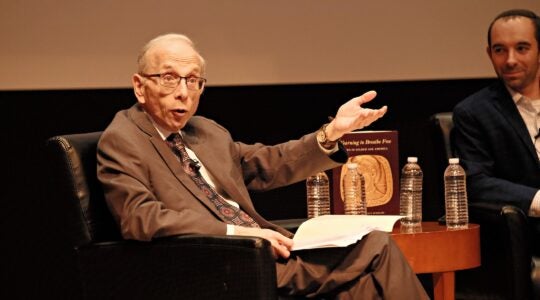The debate over Yeshiva University’s recent forum, “Being Gay in the Orthodox World,” concerns not just the specific issue at hand, how Orthodox Judaism should relate to homosexuality. It also, and perhaps even more significantly, concerns the broader question of the current state of Orthodoxy.
To be sure, the issue itself is important: Orthodox culture, buttressed by an explicit biblical prohibition, strongly condemns homosexual acts, yet there is a subculture of homosexuals within Orthodoxy that, most agree, merits understanding and sensitivity. People committed to Orthodoxy whose sexual orientation is so contrary to its norms undergo deep inner conflict, potentially leading to personal tragedies. Some Orthodox leaders argue that the discussion should be restricted to the private sphere lest public airing legitimize homosexuality.
In fact, however, it is precisely the pressure Orthodox homosexuals feel, forcing them to hide their feelings, that warrants broad communal education as to the real situation of gays within the Orthodox community.
The argument is often made that homosexuality is a matter of choice, and that an Orthodox Jew engaging in it has made a free-will decision to disobey Jewish law. However given the culture of Yeshiva University, it is difficult, if not impossible, to imagine any of its students voluntarily choosing a homosexual orientation. As an undergraduate at Yeshiva in the 1960s, I knew a handful of gay students. Generally, they were marginalized by their peers, myself included, I am sorry to say. Subsequently, when I served on the faculty, I do not recall either private or public discussion of the issue. Surely, an open forum was long overdue, and its organizers deserve great credit for their courage and leadership.
More fundamentally, however, the forum on Orthodoxy and homosexuality vividly illustrates the growing distance between Orthodox and non-Orthodox Jewry, two worlds that operate, as it were, in different dimensions within a fractured Jewish people. And as Orthodox Judaism experiences significant demographic growth and becomes an even more vital factor in Jewish communal life, the gulf between these two worlds looms increasingly ominous.
Take, for example, the charge by opponents of the forum that public discussion will cause a chillul Hashem, desecration of God’s name. For most non-Orthodox Jews, by contrast, refusal to hold such a forum would greatly damage the image of Orthodoxy. Moreover, the forum broke little new ground. Some years back, the movie “Trembling Before G-d,” which made similar points, was shown at various Orthodox venues and resulted in no chillul Hashem. Surely for an Orthodox institution to engage a controversial issue candidly and respectfully will only sanctify God’s name.
Underlying the growing chasm in Jewish life is Orthodoxy’s shift rightward, propelled by the ascending influence of roshei yeshiva (Talmud faculty) within Orthodox culture. These individuals are preeminent rabbinic scholars, but often live in an ivory tower isolated from communal realities. They articulate a pristine view of the yeshiva as a fortress resisting external influences. Reportedly, the roshei yeshiva of Yeshiva University were invited to address the forum, but chose to boycott it instead.
Ironically, the rising profile of Orthodoxy actually positions it to engage contemporary values constructively: to make use of the unprecedented opportunities offered by the openness of American society to strengthen Judaic observance and Torah study, while serving as a check on the excesses of unbridled individualism. But such effective engagement can occur only if Orthodoxy is willing to expose itself to honest dialogue and criticism.
Even from the standpoint of public relations, Orthodox isolation is damaging its image in the broader Jewish world. To cite several recent examples, the leading American Orthodox rabbinical organization condemned Rabbi Haskel Lookstein for participating in an interfaith service honoring President Obama; the Chief Rabbi of Madrid refused Jewish burial for a child whose mother had converted many years previously under Conservative auspices; and a woman was arrested at the Western Wall for the “crime” of wearing a tallit.
As this last example suggests, the problem is particularly acute in Israel, where the Orthodox establishment frequently invokes the coercive power of the state to enforce its will on a non-Orthodox majority. Yet in the diaspora, too, Orthodox isolation from broader Jewish communal concerns undermines Jewish unity and deprives Orthodoxy of the opportunity to help shape the Jewish future.
To begin healing the rift, we must differentiate between the various divisive issues. Some, particularly those dealing with personal Jewish status, e.g., patrilineal descent, may well prove intractable, defying immediate resolution. Others require greater mutual understanding between Orthodox and non-Orthodox Jews. The liberal movements need to engage the Orthodox and challenge them to distinguish between areas that are negotiable and those where no accommodation is possible.
In still other areas, Orthodox leaders need to think seriously whether by insisting on the most extreme public-policy positions, they do damage to themselves that outweighs anything they can possibly gain. Last, Israel requires a new social contract that safeguards its core identity as a Jewish state, yet preserves freedom of choice for individuals.
Most important is the struggle within the Orthodox camp for the soul of Modern Orthodoxy, as illustrated by the conflict at Yeshiva University over holding the forum. Will Orthodox Judaism be open to dissenting opinions and inclusive of all Jews, or closed-minded and dismissive of anything with which it disagrees? This ongoing struggle within Orthodoxy has existed since the mid-19th century, but the stakes today are considerably higher. Orthodoxy is no longer fighting a rearguard battle to maintain its turf. Given its demographic growth and intense commitment to Israel, the Jewish people, and the power of Judaic study, it is well-poised to exercise constructive leadership within the Jewish people. It may do so, however, only if it engages modern culture and the non-Orthodox Jewish world with the seriousness these merit.
Steven Bayme serves as director of the William Petschek Contemporary Jewish Life Department of American Jewish Committee.
The New York Jewish Week brings you the stories behind the headlines, keeping you connected to Jewish life in New York. Help sustain the reporting you trust by donating today.




